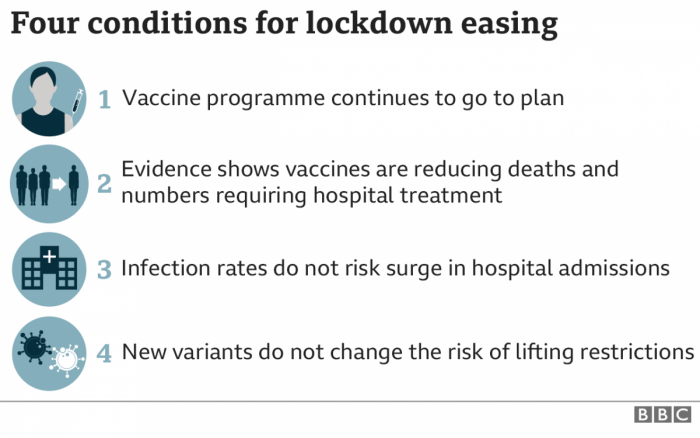Is the world ready to remove restrictions?
16.03.213188
The world is preparing for the opening of borders. Developed countries set their own exit routes, but they generally move in the same direction, although at different speeds, during a pandemic.
As the rollout of the coronavirus vaccine in the UK has shown that it has produced “impressive” results, we will focus on a plan to ease restrictions by the UK government.
At the end of February, Boris Johnson unveiled a plan to lift restrictions in England by 21 June.
A new four-phase plan to ease isolation in England could call for the removal of all legal restrictions on social contact by June 21, if strict conditions are met: the country must pass four vaccine tests, the infection rate must fall and no new variants of the coronavirus emerge. There will be an interval of at least five weeks between each subsequent stage of the plan so that the impact of the changes on the infection rate and the number of hospitalizations can be assessed.
Removal of restrictions. Step by step.
Step one.
• From 8 March - all schools will be open with permitted out-of-school sports and activities. Recreation in open public areas such as a park will be allowed between two people, meaning they will be allowed to have coffee or have a small picnic together.
• From March 29 - Open-air gatherings of six people or two families are allowed. Tennis courts, basketball, and football courts will reopen, and mass sports such as football will be allowed.
High school students will be required to wear protective masks on school grounds.
Step two.
From April 12, it will be allowed to resume the work in the main sectors of the economy:
• Opening of minor shops, hairdressers, and some public buildings.
• Opening of takeaway restaurants, swimming pools, and gyms, theme parks.
• Self-contained vacation accommodation such as self-catering apartments and campgrounds
The revision of travel restrictions abroad will be announced no earlier than April 12.
Step three.
Effective May 17 - data permitting - the “rule of six” for outdoor gatherings will be removed and replaced by the 30-person limit:
• Mixing of people from 6 households will be allowed in restaurants and pubs.
• Cinemas, museums, hotels, shows, and sporting events reopen, although social distance persists.
• Up to 10,000 spectators can visit the largest outdoor seating areas such as football stadiums.
Up to 30 people will be able to attend the celebrations.
At this stage, the UK government will also consider the potential role of Covid status certification - the so-called “vaccine passports”.
Stage four.
From June 21, it will potentially lead to the removal of all legal restrictions on social contacts, as well as the reopening of the last closed sectors of the economy, such as nightclubs.
The government hopes that from this date the restrictions on celebrations will also be lifted.
MPs will vote on a plan to lift restrictions in the country at the end of March.
Why caution?
Vaccines are working well and infection rates in the UK have dropped fivefold since the beginning of the year.
So why many might ask, is there such caution?
The answer lies in the large amount of data released by the UK government when it unveiled a plan to lift the restrictions.
Among the documents was a model made by Imperial College London. It showed that a rapid easing of restrictions could lead to a sharp increase in the number of deaths during the summer and by mid-2022. Due to the fact that no research can take into account seasonal impact, since warmer weather can have a significant reduction in the spread of the virus, the countries' exit plan from the coronavirus restrictions will be reviewed every five weeks.
Vacation bookings by British residents have skyrocketed following plans to exit quarantine.
Travel agencies and airlines have reported a sharp increase in bookings following the unveiling of a plan to ease the isolation.
Despite the UK government's announcement that a decision to facilitate international travel will not take place until mid-May, Britain's largest travel company Tui said overnight bookings for overseas travel jumped 500%, although most Britons continue to book domestic vacations.
Despite the high level of bookings, many questions remain about how international travel will resume and there is no guarantee that they will start again in mid-May.
Over the past few months, the industry has put restrictions on top of restrictions, including bans on visitors from all over the world, the introduction of quarantine hotels, and the need for multiple tests. Therefore, the exit is treated with caution.
The lifting of any restrictions will depend on location, vaccine deployment progress in each country and abroad, and mortality and hospitalization rates.
Covid: Why can't we lift the restrictions faster?
The key mantra before the announcement is that every step forward must be irreversible. There should be no steps back.
But despite the decline in infection rates, the number of new daily cases is still relatively high compared to the summer and early fall. Many vulnerable people are not yet protected by the vaccine.
By the first step out of quarantine - the moment the schools were opened, Great Britain managed to vaccinate all people over 70 years old. But, today, a significant number of people are still at risk. Almost half of those hospitalized with Covid in the winter of 2020-2021 are under 70 years of age.
Infection + vaccination = ideal breeding ground for mutations
Mutations are expected. The increased immunity levels resulting from further vaccine deployment will favor options that could slip past the vaccine.
This does not mean that mutations will render vaccines completely ineffective - but experts warn that everything possible must be done to prevent mutations at such a difficult time.
There is hope, but the restrictions will still have a huge impact on people's lives in the coming months.
Источник : BBC News






















